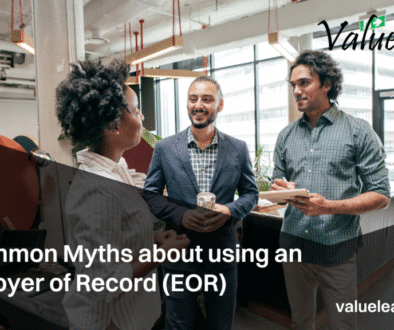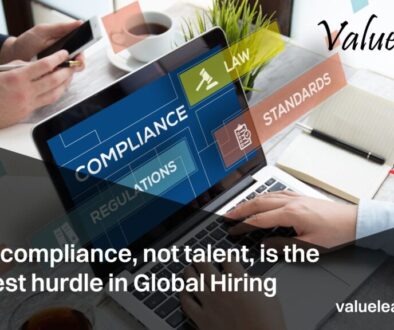The role of Employer of Record (EOR) in Global Expansion: A Smarter way to scale your business
Expanding into international markets is a major milestone for any business. It opens doors to new revenue streams, diverse talent pools, and fresh market opportunities. However, global expansion isn’t just about strategy, it’s about execution.
For companies eager to scale across borders, the biggest challenges are often legal, HR, and compliance-related:
- How do we legally hire employees in a new country without an entity?
- What are the tax and employment law requirements?
- How do we manage payroll across multiple currencies and jurisdictions?
- How can we ensure compliance while focusing on business growth?
These challenges slow down expansion, increase operational costs, and expose businesses to compliance risks—often turning an exciting opportunity into a legal and administrative nightmare.
This is where an Employer of Record (EOR) plays a crucial role.
What is an Employer of Record (EOR)?
An Employer of Record (EOR) is a third-party organisation that legally employs workers on behalf of a business in a foreign country.
Instead of setting up a local entity, which can take months and require extensive legal and financial investment, companies can use an EOR to hire employees immediately while remaining fully compliant with local labor laws.
An EOR takes care of:
✅ Employment contracts and local labor law compliance
✅ Payroll processing and tax filings
✅ Social security contributions and statutory benefits
✅ Visa and work permits (where applicable)
✅ Risk mitigation for legal and regulatory changes
With an EOR, companies can focus on their business while experts handle compliance, payroll, and HR complexities in the background.
How does an EOR enable Global Expansion?
1. Fast-track market entry
Setting up a legal entity in a new country can take 6–12 months, requiring company registration, banking, tax setup, and licensing. An EOR eliminates this delay by allowing businesses to hire talent immediately—often within days or weeks.
Example:
A U.S.-based software company wants to hire developers in Germany. Instead of waiting months for entity registration, they use an EOR to onboard employees in less than two weeks—keeping their product development on track.
2. Eliminates compliance risks
Each country has different labor laws, tax regulations, and employment requirements. A misstep in payroll, benefits, or contract structuring can result in legal penalties, reputational damage, and employee disputes.
An EOR acts as the legal employer, ensuring full compliance with local regulations—so businesses can scale confidently without worrying about fines or lawsuits.
Example:
A UK-based marketing agency hires freelancers in Brazil, unaware that local laws require specific benefits for independent contractors. Using an EOR, they ensure compliance without restructuring their operations.
3. Cost-effective alternative to entity setup
Expanding globally can be expensive, with costs associated with legal teams, tax filings, and HR infrastructure. An EOR eliminates the need for these investments, allowing businesses to scale without committing to permanent operations.
Example:
A Canadian e-commerce brand wants to test demand in Japan before fully committing to the market. Instead of registering a local business and hiring legal consultants, they use an EOR to hire a small team—saving time and money.
4. Smooth Payroll & Benefits Management
Handling multi-country payroll is complex, requiring different tax calculations, compliance with local laws, and payment processing in multiple currencies. An EOR automates payroll processing and ensures employees receive the right salary, benefits, and tax deductions.
Example:
An Australian tech startup hires remote employees across five countries. Instead of navigating different tax laws, payment platforms, and compliance rules, they rely on an EOR to handle global payroll seamlessly.
5. Ensures a great employee experience
Employee satisfaction matters, especially in competitive talent markets. An EOR ensures a smooth onboarding experience, timely salary payments, access to local benefits, and compliance with worker rights—helping businesses attract and retain top talent.
Example:
A U.S. startup hires sales reps in France and Mexico. Employees expect local benefits like healthcare and pension contributions. The EOR manages all employee benefits and HR administration, ensuring a compliant and positive experience.
Who should consider using an EOR?
An EOR is ideal for companies that:
✔ Want to hire in new markets without setting up a local entity
✔ Need to test a new market before making a long-term investment
✔ Require fast hiring solutions to stay competitive
✔ Lack the legal, tax, and HR expertise to manage global employment
✔ Prefer a cost-effective approach to international expansion
Industries that commonly use EORs include tech startups, e-commerce brands, professional services, and remote-first companies looking to scale quickly.
Why businesses trust ValueLeaf for Global Expansion?
At ValueLeaf, we help businesses hire top talent across 150+ countries—without the legal, tax, or HR burden.
🔹 Hire in any country, instantly – No entity setup needed
🔹 Full compliance, zero risk – We manage contracts, payroll, and tax filings
🔹 Seamless employee experience – Timely salaries, benefits, and local HR support
🔹 Scalability & flexibility – Expand or downsize teams with ease
The global workforce is more connected than ever, and businesses that move fast gain a competitive edge.
If you are looking to expand into new markets without delays, compliance risks, or excessive costs?
Then an Employer of Record is the smartest way forward.




